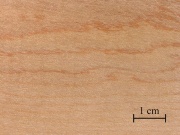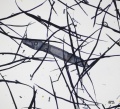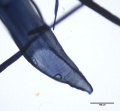Difference between revisions of "Yellow birch"
Jump to navigation
Jump to search
m (Text replace - "== Authority ==" to "== Sources Checked for Data in Record ==") |
|||
| (2 intermediate revisions by the same user not shown) | |||
| Line 1: | Line 1: | ||
| − | [[File:yellowbirchbarkf5.jpg|thumb|Yellow birch | + | [[File:yellowbirchbarkf5.jpg|thumb|Yellow birch ''Betula alleghaniensis'']] |
| − | |||
| − | ''Betula alleghaniensis'']] | ||
== Description == | == Description == | ||
| − | A medium-sized deciduous tree, Betula lutea or Butela alleghaniensis, native to North America. It is most often found in the Appalachian Mountains and as far west as the Great Lakes region and north to Canada. The yellow birch produces a pale reddish-yellow wood that is tough and heavy. It is used for flooring, interior trim, millwork, veneer, and | + | A medium-sized deciduous tree, ''Betula lutea'' or ''Butela alleghaniensis'', native to North America. It is most often found in the Appalachian Mountains and as far west as the Great Lakes region and north to Canada. The yellow birch produces a pale reddish-yellow wood that is tough and heavy. It is used for flooring, interior trim, millwork, veneer, furniture and paper pulp. Most wood sold as 'birch' in North America is from this tree. |
== Synonyms and Related Terms == | == Synonyms and Related Terms == | ||
| − | + | birch; ''Betula lutea''; ''Butela alleghaniensis'') | |
| − | [[File:28_Birch.jpg|thumb|Birch | + | [[File:28_Birch.jpg|thumb|Birch (''Betula lutea'')]] |
| − | + | == Physical and Chemical Properties == | |
| − | == | ||
Tree height = 25 m Bark = golden brown to gray, peeling in horizontal strips Flower = catkin (2-3 cm long) in spring | Tree height = 25 m Bark = golden brown to gray, peeling in horizontal strips Flower = catkin (2-3 cm long) in spring | ||
| − | + | Density = 43 pcf | |
| − | |||
| − | |||
| − | |||
| − | |||
| − | |||
| − | |||
| − | |||
== Additional Images == | == Additional Images == | ||
| Line 35: | Line 25: | ||
</gallery> | </gallery> | ||
| − | == | + | == Resources and Citations == |
* G.S.Brady, ''Materials Handbook'', McGraw-Hill Book Co., New York, 1971 Comment: p. 130 | * G.S.Brady, ''Materials Handbook'', McGraw-Hill Book Co., New York, 1971 Comment: p. 130 | ||
| Line 45: | Line 35: | ||
* Edward Reich, Carlton J. Siegler, ''Consumer Goods: How to Know and Use Them'', American Book Company, New York City, 1937 | * Edward Reich, Carlton J. Siegler, ''Consumer Goods: How to Know and Use Them'', American Book Company, New York City, 1937 | ||
| − | * | + | * Virginia Tech Dendrology website at www.fw.vt.edu/dendro/dendrology/main.htm (accessed Oct. 3, 2005) |
| − | * Wikipedia | + | * Wikipedia: http://en.wikipedia.org/wiki/Yellow_Birch (Accessed Oct. 3, 2005) |
[[Category:Materials database]] | [[Category:Materials database]] | ||
Latest revision as of 16:05, 4 September 2020
Description
A medium-sized deciduous tree, Betula lutea or Butela alleghaniensis, native to North America. It is most often found in the Appalachian Mountains and as far west as the Great Lakes region and north to Canada. The yellow birch produces a pale reddish-yellow wood that is tough and heavy. It is used for flooring, interior trim, millwork, veneer, furniture and paper pulp. Most wood sold as 'birch' in North America is from this tree.
Synonyms and Related Terms
birch; Betula lutea; Butela alleghaniensis)
Physical and Chemical Properties
Tree height = 25 m Bark = golden brown to gray, peeling in horizontal strips Flower = catkin (2-3 cm long) in spring Density = 43 pcf
Additional Images
Resources and Citations
- G.S.Brady, Materials Handbook, McGraw-Hill Book Co., New York, 1971 Comment: p. 130
- Dictionary of Building Preservation, Ward Bucher, ed., John Wiley & Sons, Inc., New York City, 1996
- External source or communication Comment: Hardwood Manufacturers Institute, Memphis Tenn.: air-dry weight = 43 pcf
- Edward Reich, Carlton J. Siegler, Consumer Goods: How to Know and Use Them, American Book Company, New York City, 1937
- Virginia Tech Dendrology website at www.fw.vt.edu/dendro/dendrology/main.htm (accessed Oct. 3, 2005)
- Wikipedia: http://en.wikipedia.org/wiki/Yellow_Birch (Accessed Oct. 3, 2005)






